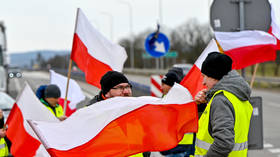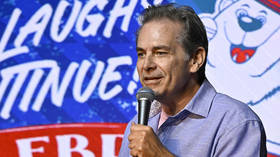Latvia split over ‘fascist cemetery’
A political row has broken out in Latvia over the commemoration in a Riga war cemetery of Italian fascist leader Benito Mussolini.
Adding to the dispute is the presence in the war cemetery of another grave – that of a Latvian man accused of killing tens of thousands of Jews.
The head of Latvia’s anti-fascist committee, Joseph Koren, says he knows Riga like the back of his hand. But he was astonished to find that Voldemars Veiss was laid to rest among heroic soldiers who died fighting for their motherland.
He says Veiss was one of the key figures responsible for the deaths of tens of thousands of Jews during WW2 Koren says it’s outrage that he’s buried at Riga's most prestigious war cemetery.
“This is the most honourary place where school children are brought to learn what patriotism is. Unfortunately, in 1944 a person who cannot be called a hero was buried here. This is against all international and European canons. He is neither a hero, nor a man of honour, but a monster,” Koren says.
But Voldemars Veiss is not the only controversial figure at this landmark war cemetery where over 2,000 people who fought against Nazis are commemorated.
Four years ago a memorial plaque to Italian fascist Benito Mussolini was put up there.
In 1925, Mussolini – an ally of Hitler and one of founding fathers of European fascism – was awarded with Latvia's highest military honour for courage – the Order of Lacplesis.
“It’s probably the only place in the world where Mussolini is eternalised as a hero – not as a criminal, Hitler’s ally and a butcher,” Koren says.
A political debate has broken out over why one of the world's most notorious fascists is commemorated in Riga.
Latvia’s Culture Minister Helena Demakova wouldn’t say whether she considered Mussolini a war criminal or not.
Although she suggested that it was the city's memorial to the Soviet Army's fight against Nazi Germany that needed to be demolished.
It, she was quoted as saying, “celebrates criminal regimes much more than the tiny names of Mussolini and Veiss in the war cemetery.”
Helena Demakova was not available for an interview but RT asked Latvia’s State Heritage Protection Board to explain.
“It's not so significant who is buried and where. Thousands of soldiers are laid to rest in this war cemetery. When people come here, they come across not only the names of Veiss and Mussolini. They visit a sacred place,” said Janis Asaris from the State Heritage Protection Board.
History is in the making – and not all Latvians are aware of what their leaders are choosing to commemorate.












